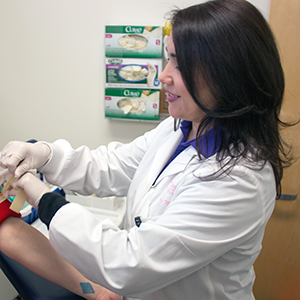Laboratory
Laboratory tests must be ordered by a licensed physician (MD, DO), Physician Assistant (PA), or Advanced Practice Provider (APP). Patients should schedule laboratory appointments either by calling the office or by using the MyNM portal. 
The Student Health Service laboratory specializes in drawing blood and collecting appropriate specimens for laboratory tests. Some laboratory tests, such as Point of Care tests (eg. for influenza A/B, COVID-19, strep throat, mononucleosis, etc.), can be performed onsite and must be ordered by a Northwestern Medicine Student Health Service Clinician. Most tests are sent to Northwestern Medicine's reference laboratory. All tests performed by or sent out from the Student Health Service are billed to insurance. Students with NU-SHIP have 100% coverage for laboratory tests sent from the Student Health Service.